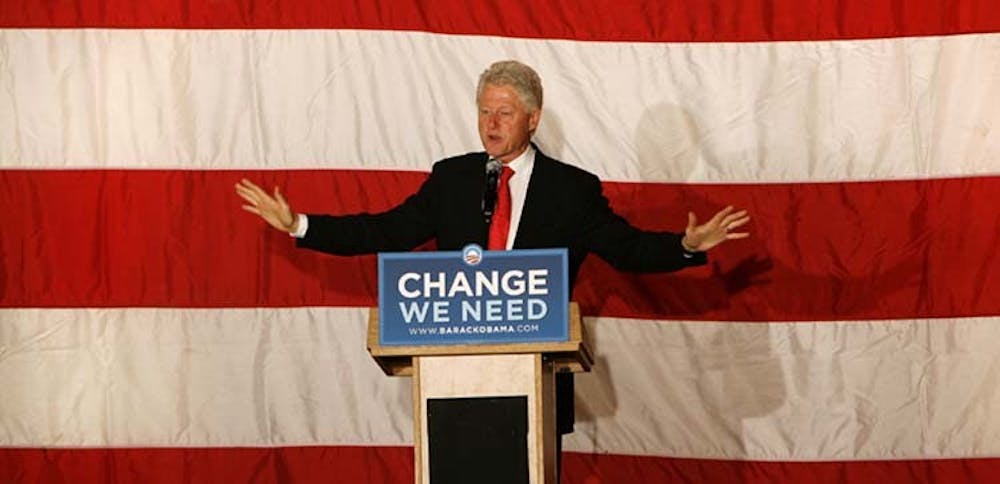Former President Bill Clinton told an enthusiastic and attentive crowd at Virginia Commonwealth University Sunday night that during the last eight years, America has seen the largest increase in economic inequality since the 1920s.
"The cost of college education has gone up 75 percent," Clinton said. "The cost of health care has more than doubled, the cost of gasoline has exploded. Ninety percent of the benefits of the last decade have gone to the top 10 percent and over 40 percent to the top 1 percent."
Clinton spoke for 25 minutes in front of about 3,500 mostly college-aged people. He was there to support Sen. Barack Obama's presidential campaign, mainly discussing the turbulent economy and the underlying causes of last week's financial meltdown.
"Last week alone, America lost over a trillion dollars in wealth," he said.
Clinton blamed the radical fluctuation in the market on the Bush administration and Treasury Secretary Henry Paulson's push to allow short-selling.
When the crisis first surfaced, the Securities and Exchange Commission suspended short-selling, a practice that allows investors to invest by betting that a stock's value will decline, but reinstated it before last weeks collapse. During the Clinton administration, a regulation called the uptick rule was in place, which prevented short-sellers from driving the value of a stock down if that stock was already in sharp decline. The SEC eliminated the uptick rule in 2007.
Clinton, who has been criticized for giving Obama what appears to be a half-hearted endorsement, said that Obama had a "presidential moment" when the financial crisis hit.
Clinton said that he was impressed with Obama when the financial crisis hit: He did not immediately make a statement, but made sure he understood the problem and talked to the people who knew the most about it.
Obama's willingness to support the $700 billion bail out package -- even though it was unpopular -- also impressed Clinton, he said.
"In other words, he said, 'If you trust me to do what is right, I'll trust you to judge me accordingly, and I'm prepared to live with the consequences,'" Clinton said of Obama. "That's what a president should do in an emergency. He passed that test with flying colors."
Enjoy what you're reading?
Signup for our newsletter
Obama and Arizona Sen. John McCain, the Republican nominee, are battling for Virginia's 13 electoral votes, which haven't gone to a Democrat in the general election since 1964. Polls averages show Obama has a slight lead over McCain in Virginia, but many pundits consider the race still too close to call just weeks before the Nov. 4 contest. McCain's vice presidential nominee, Gov. Sarah Palin of Alaska, will speak Monday at the Richmond International Speedway.
Several major elections have gone to the Democrats in recent years, including the election of Tim Kaine as Virginia's governor and Jim Webb to U.S. Senate.
Clinton also endorsed Obama's energy proposal, saying that investing in energy independence would create jobs and strengthen national security. Securing the economy and creating energy independence were interrelated, he said.
"Obama says his energy plan will create 5 million jobs," he said. "Hillary said the same thing when she was running for president. I'm not running for anything. I don't have the incentive to not exaggerate. I think his plan will create far more than 5 million jobs if we make a commitment to maximum efficiency and maximum renewable energy.
"We had no job strategy because we got away from what we should have done -- what [Obama] will do -- and that is make a serious commitment to energy independence."
Clinton said that he watched the second presidential debate and said the main difference he saw in the candidates was their approach to health care.
"I listened to his opponent speak, and I thought he meant well," he said. "But when I heard Barack Obama talk, I said to myself, 'This guy understands the problem. He understands health care and he's got a proposal that will actually help Americans get coverage, keep coverage and break the back of this cost spiral.'"
The loudest applause from the crowd came when he said that Obama would help restore America's position in the world.
"He understands the limits of military force and that it should be used as a last resort and not a first," Clinton said.
Clinton closed his speech by demonstrating his famous ability to verbally attack Republicans.
"For six of the last eight years," he said, "we now know what happens when [Republicans] can actually do everything they promised to do because they had the White House and Congress. This is not about good people and bad people, this is about good ideas and bad ideas, and they have got us on the wrong course."
Several University of Richmond students who heard Clinton speak said that they came because they agreed with Clinton's policies during his presidency.
"I thought his health care initiative was really good, and he was great economically," sophomore Greg Wells said. "Even though he raised taxes, we still had a surplus when he left office."
Sophomore Haddis Tujuba said he agreed with Clinton's handling of the Bosnian crisis. In 1995, Clinton led NATO forces in air-strikes against the Bosnian Serb Army -- led by president Slobodan Milo\0x0161evi\0x0107 -- after word spread of vast ethnic cleansing in the region.
"I liked how he cleanly handled the Bosnia situation," he said. "Not like Iraq."
Contact staff writer David Larter at david.larter@richmond.edu
Support independent student media
You can make a tax-deductible donation by clicking the button below, which takes you to our secure PayPal account. The page is set up to receive contributions in whatever amount you designate. We look forward to using the money we raise to further our mission of providing honest and accurate information to students, faculty, staff, alumni and others in the general public.
Donate Now



